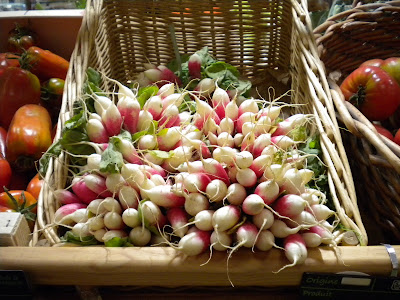

Something I do every time I get back from New Morning Farm every Saturday is to make omelets for the family using only ingredients picked up that morning. Not only do they keep you feeling great all day, but they also don't weigh you down.
The omelet shown here consists of crimini mushrooms, onion, heirloom tomatoes, kale, basil, and some arugula added on at the very end.
The preparation of omelets like these take no time and the cooking time takes even less.
Here are the measurements for this one:
- 2-3 free range organic eggs (per person depending on how hungry you are)
- 3-4 crimini mushrooms (gently washed or brushed to remove excess dirt), sliced roughly (per person)
- a handful of a peeled, diced yellow onion(half a large one is suitable for about 3 people)
- 4 pieces of a small tomato per person(if you want to take out the seeds go ahead)
- 1 large kale leaf chopped small (suitable for 4 people)
- 1 handful of washed and dried arugula (per person)
- 2 medium sized basil leaves sliced somewhat thinly (per person)
- sea salt and cracked black pepper to taste
- a splash of extra virgin cold pressed olive oil (enough to coat pan, adding another splash after each omelet)
Once you have all of the ingredients ready its time to create. Heat a pan (preferably nonstick) over medium-high heat, whisk together the eggs in a small bowl until they are combined and add the salt and pepper (a pinch of both should do it). Now add the olive oil and move it around the pan until it is coated completely. Pour the eggs into the pan and immediately reduce the heat to low (to prevent the eggs from cooking too fast and too much). You can now start to add the rest of your ingredients, toss in the sliced basil, mushrooms, onions, tomatoes, and kale. By this time the the eggs should be about done (if they look too watery then you can continue cooking them until they are a little firmer, depending on how you like them). Give the pan a shake and move the omelet around to prevent sticking (it should still be circular). You can now use a spatula to fold half of the omelet over on top of the other half, then use your spatula again and transfer the omelet to a plate. Garnish with the arugula and drizzle with a little more olive oil and some lemon juice. Once you get the hang of this it becomes quite simple, and is just about the healthiest and, if you ask me, delicious way to start your day (or even to end your night).
As you will notice the omelet stuffing is quite raw, however the heat of the eggs cause the ingredients to develop their flavor a little more and mix lightly.
I want to clear up a very common misconception right here, right now--that egg yolks are bad for you and egg whites are good for you. This isn't true. Eating the whole egg is ideal for several reasons. The first is that you get protein and omega 3 fatty acids (promotes brain health) from the entire egg, not just the white. For those of you who care about your calorie intake, eggs only have about 68 calories. There are many other health benefits to eggs which I will not get into right now, but if you would like to look into it more go to the
World's Healthiest Foods website. It has fantastic information on tons of different foods.
This post is the last I will make in America for 9 months, for I will be spending my senior year of high school in Rennes, France. I will post as often as I can while I am there, about 1-2 times a week. It should be quite an adventure and I look forward to sharing tidbits of information I pick up about food over there, I hear they take it rather seriously...
A votre santé.










